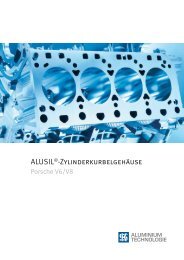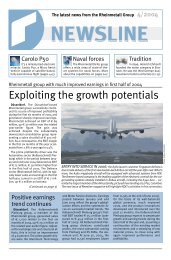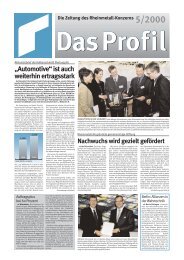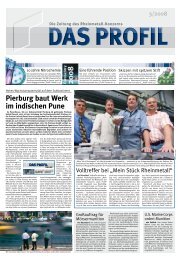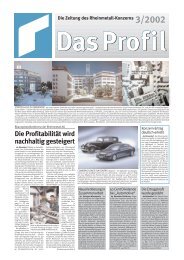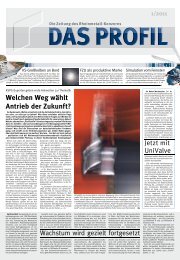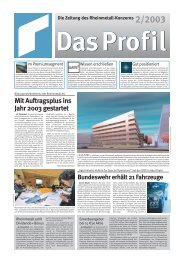PDF [2.1 MB] - KSPG AG
PDF [2.1 MB] - KSPG AG
PDF [2.1 MB] - KSPG AG
Create successful ePaper yourself
Turn your PDF publications into a flip-book with our unique Google optimized e-Paper software.
Düsseldorf. On March 1, 2004, Rheinmetall’s chairman<br />
Klaus Eberhardt also took over at the helm of Rheinmetall<br />
DeTec <strong>AG</strong>. In view of the security-political relevance of the<br />
defence business, this move which has put Eberhardt in<br />
charge of Rheinmetall’s Defence activities has been followed<br />
with interest by the German Bundeswehr and political<br />
circles. Shortly after his appointment, the military<br />
Newsline<br />
Rheinmetall DeTec chairman Klaus Eberhard in “Soldat und Technik”<br />
Foreign markets to be tapped further<br />
Soldat und Technik: In addition to<br />
your responsibility as the chairman of<br />
the executive board of Rheinmetall <strong>AG</strong><br />
you have now also taken on the task of<br />
executive board chairman of Rheinmetall<br />
DeTec <strong>AG</strong> (Düsseldorf). Can you<br />
outline the main focus of your new<br />
tasks in future?<br />
Eberhardt: In view of the political significance<br />
of the defence business, I believe<br />
it is indeed a very special responsibility<br />
to have been put in charge of<br />
Rheinmetall’s Defence sector. The Bundeswehr<br />
remains our most important<br />
customer, although we are naturally also<br />
aware of the security-political significance<br />
of our defence activities on an<br />
international scale.<br />
The change at the head of Rheinmetall<br />
DeTec assures a maximum degree of<br />
continuity. As you know, as executive<br />
board chairman of Rheinmetall <strong>AG</strong> I<br />
have been in command of the group’s<br />
business for four years. In this role I<br />
have obviously followed the major issues<br />
of our Defence sector very closely<br />
over the years and have established a<br />
close and trusting dialog with our contacts<br />
– the armed forces, political circles<br />
and the administration. I intend to continue<br />
and intensify this dialog in future.<br />
Soldat und Technik: Especially also in<br />
the light of the transformation process<br />
(of the international armed forces)…<br />
Eberhardt: …we at Rheinmetall will<br />
remain a strong and reliable partner of<br />
the Bundeswehr. We think it is our duty<br />
to give the technological momentum<br />
based on the new requirements, and to<br />
use our core competencies as an innovation<br />
drive for the equipment and systems<br />
of the armed forces. I also want to<br />
push ahead with the growing internationalization<br />
of Rheinmetall DeTec <strong>AG</strong><br />
since this is not only the precondition<br />
for further growth but also crucial to<br />
sustaining our technological lead.<br />
Soldat und Technik:Do you plan to introduce<br />
any changes in your group in<br />
reaction to the changed framework<br />
conditions of the Bundeswehr and future<br />
European security aspects?<br />
Eberhardt: I am convinced that the<br />
Rheinmetall DeTec group with its existing<br />
range of products and capabilities<br />
is well prepared to participate in the<br />
imminent change on national and international<br />
markets. We have helped to<br />
shape the German and European consolidation<br />
in ground forces technology<br />
since 1990, and have concentrated the<br />
competencies under one umbrella,<br />
making us the leading systems company<br />
in this sector today. Naturally, this<br />
involved a painful process of capacity<br />
adjustments. The force transformation<br />
which has now been initiated will lead<br />
to a further change of industrial structures<br />
in the medium term. This transformation<br />
is absolutely vital and is irreversible,<br />
involving both challenges and<br />
opportunities for Rheinmetall.<br />
Soldat und Technik: Is this already reflected<br />
by new products or key development<br />
activities today?<br />
Eberhard: Yes, of<br />
course. Let me give<br />
you one example<br />
from our Weapon<br />
and Ammunition<br />
business unit.<br />
Large-caliber<br />
weapon systems<br />
clearly play a less<br />
significant role than<br />
about fifteen years<br />
ago. So-called non-<br />
lethal weapons are, for instance, one<br />
key area of work today; these are nonlethal<br />
systems ranging from high-power<br />
microwave to laser guns and plasma<br />
tasers. All of these technologies will<br />
play a crucial role for armed forces concerned<br />
with security at home and<br />
abroad. Such new products are also a<br />
reaction not only to the changed threat<br />
scenarios but also to the fact that there<br />
is no longer a clear distinction between<br />
national and international security.<br />
We are, however, still working very<br />
successfully in the large-caliber sector,<br />
e.g. on the Pele technology in which a<br />
number of customers have already expressed<br />
interest. This principle offers a<br />
14<br />
periodical Soldat und Technik – published by Report<br />
Verlag (Frankfurt am Main/Bonn) and one of the leading<br />
German defence publications that is widely read by parliamentary<br />
and political circles – asked Eberhardt about<br />
his goals and the future strategic orientation of the<br />
Rheinmetall DeTec group. The article below gives a translation<br />
of the interview printed courtesy of the publishers.<br />
Klaus Eberhardt<br />
cost-effective means of adapting existing<br />
combat munitions to modern military<br />
demands, and we are optimistic<br />
that this approach will be successful.<br />
Tactical reconnaissance technologies<br />
like those used for unmanned air vehicles<br />
are another important focus of our<br />
work. The concept of networking is a<br />
key aspect in this connection.<br />
Soldat und Technik: Which brings us<br />
to the keyword Network Centric Warfare….<br />
Eberhardt: Exactly! Although I would<br />
stress that system networking is by no<br />
means new for Rheinmetall as underlined<br />
by our developments in the field<br />
of Battle Management Systems for air<br />
defence or our Lince or TTCS command<br />
systems which have been in service for<br />
some time now. And, talking of our unmanned<br />
air vehicles, let me give you<br />
another example of networked capabilities:<br />
the KZO unmanned air vehicle is<br />
part of the reconnaissance, command<br />
and control, and strike capability in<br />
conjunction with the observation and<br />
reconnaissance equipment for the Fennek<br />
reconnaissance vehicle and the<br />
self-propelled howitzer PzH 2000 and<br />
its SMArt ammunition.<br />
All these examples underline one aspect<br />
which I believe is particularly important:<br />
Although considerable performance<br />
improvements are still possible<br />
in the software sector, enhanced capabilities<br />
ultimately only exist on the basis<br />
of improved platforms. Classical<br />
arms capabilities will therefore continue<br />
to be extremely important in future, too.<br />
Soldat und Technik: The German industry<br />
has given a convincing demonstration<br />
of these capabilities with the<br />
Monarc project.<br />
Eberhardt: Quite so! Monarc (Modular<br />
Naval Artillery Concept) is a groundbreaking<br />
concept jointly proposed by<br />
Rheinmetall, HDW (Howaldtswerke-<br />
Deutsche Werft) and Krauss-Maffei<br />
Wegmann, concerning the introduction<br />
of the fielded 155mm weapon systems<br />
Continued on page 15)


![PDF [2.1 MB] - KSPG AG](https://img.yumpu.com/4218313/14/500x640/pdf-21-mb-kspg-ag.jpg)
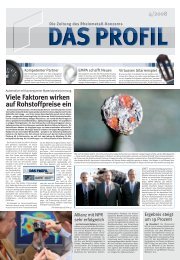
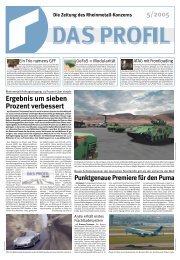
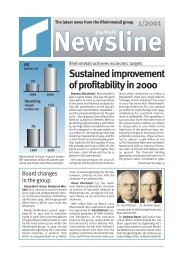

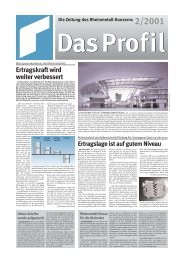
![PDF [1.0 MB] - KSPG AG](https://img.yumpu.com/5513074/1/171x260/pdf-10-mb-kspg-ag.jpg?quality=85)
